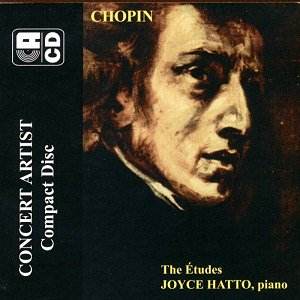Excellence in the Chopin Études can never
be taken for granted, even in the most eminent and exalted of
musicians. Imbalance between the technical and expressive elements
embedded in the music can cause irreconcilable fissures in the
music-making and can give an external show of what should be the
most intimate inter relation of finger technique and individual
imagination. In this, the first volume of her complete Chopin
series, Joyce Hatto proves herself a master of this reconciliation
and this recording demonstrates her enduring significance in the
literature.
A hallmark of her playing is digital clarity;
clarity, also of verticality in musical terms, and a care to give
prominence to the melody line without submerging accompanying
figures. She cultivates an affectionate but certainly not glutinous
profile; she doesn’t over use the pedal – there is no indiscriminate
wash of sound. Her control is remarkable, her technique seldom
called into question even in the most taxing of passages and the
sheer consistency of her playing - and its undoubted excellence
- are all deeply impressive. She brings just the right tonal weight
and expressive lexicon to the individual Études. In the
opening C major of Op. 10 she is energetic, the right hand arpeggios
of crystal clarity, the left hand resilient and strong. The E
major Lento shows us her expressive intentions; deeply poetic,
quite slow and clarity even at forte passages. Some may wish for
a greater weight of romantic expressivity but Hatto’s approach
is a nobly consistent one throughout in respect of tonal depth.
In the great G flat major, the Black Key, her playing has
an almost Mozartian grace and animation. Equally her exquisite
touch, pellucid but unselfconsciously right, brings out the nocturne
gravity of the Andante in E flat minor. Then there is her filigree
passagework in No. 11 and her compelling traversal of the Revolutionary
Étude.
Op. 25 is similarly impressive. In the opening
A flat major – which Schumann likened to the sound of an Aeolian
harp - she brings limpidity of finger work and pedalling of a
constantly illuminating kind. The effect is one of glorious fluidity,
rippling like water. Her F major positively bubbles with wit,
the A minor’s syncopations finding in Hatto a pianist who appreciates
the displaced voicings and imaginatively humorous writing. As
she proves with such consistency in the Russian literature, of
which she is still one of the leading exponents, great nobility
and gravity of utterance are evoked – as with the E minor Étude
– with the minimum of show. The G sharp minor elicits true evenness
of touch and in No. 7 in C sharp minor she is affecting without
undue sentiment. She is robust and powerful in No. 10 and full
of evocative and leonine drama in the A minor (No. 11). The Trois
Études Nouvelles, written for Ignaz Moscheles’ Piano Method,
are played with similar virtues, and winning lyricism. They also
complete a disc of high distinction, one of an increasing number
in the Hatto series on Concert Artist.
Jonathan Woolf
MusicWeb
can offer the complete
Concert Artist catalogue
